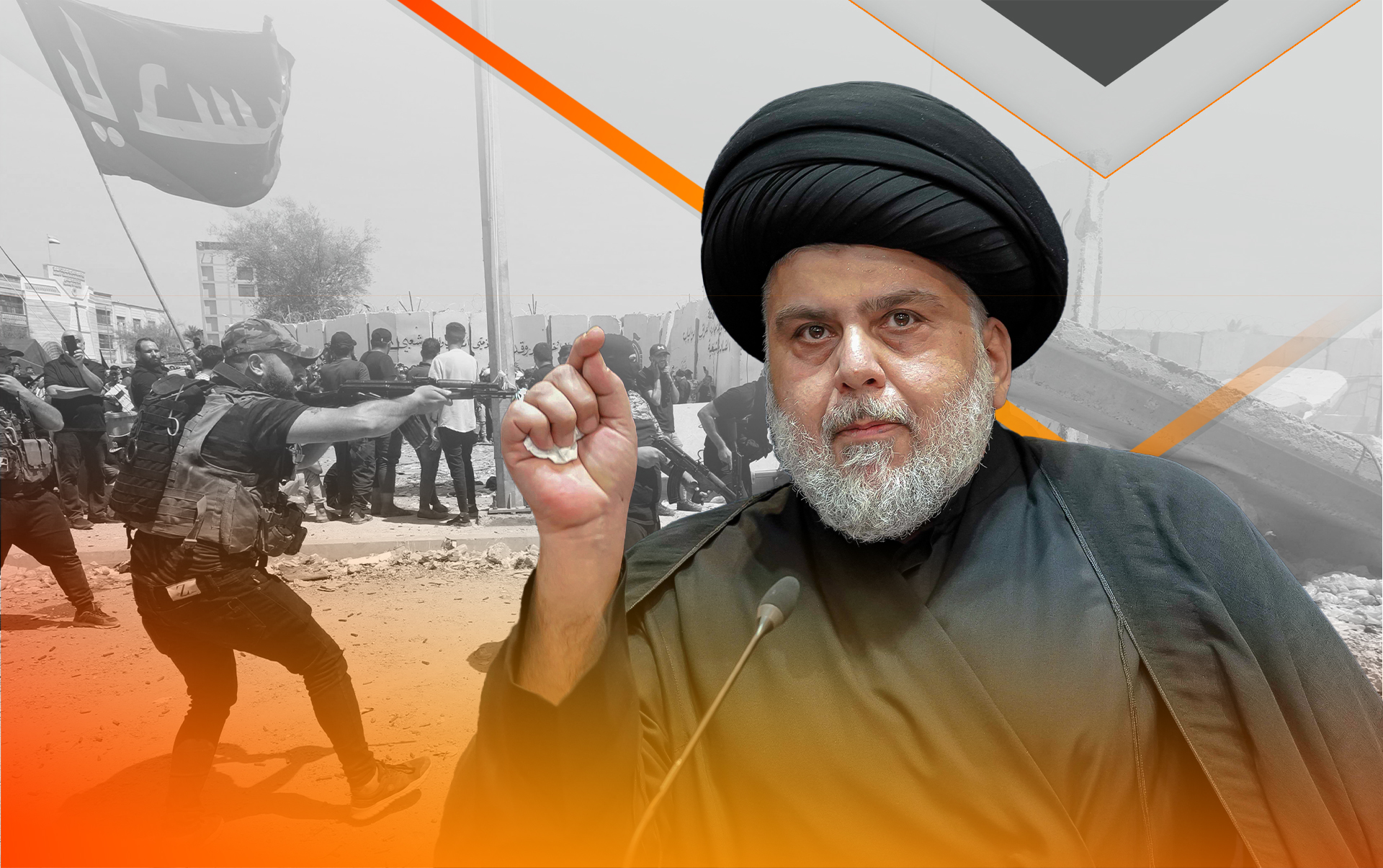A speech from Al-Sadr was enough to end the confrontations between members and supporters of the Sadrist Movement with some armed Shiite groups. After the announced “retirement”, this step was a strong return for Al-Sadr. He made it clear that despite his retirement from politics, the political process without him in the short term at least, would be complicated and unstable. It was also a confirmation of analysts’ or observers’ views who believed it was too early for the clashes to turn into a huge Shiite civil war.
Pressure and Sadr’s Response
In the past period, the Coordinating Framework attempted to implement their promises and hold a parliament session without paying attention to Al-Sadr’s request to dissolve the parliament. Ayatollah Haeri’s criticism of Sadr and the demand for Shiites to follow the “Reference” or “Marjia'” Ali Khamenei was another blow to Sadr’s religious position. It is worth observing that Al-Sadr had previously studied with Al-Haeri a lesson on “Outside Fiqh,” which teaches on how to be a reference. Based on these lessons, if Sadr wants to become a reference now, he needs to acquire approval from another reference, and he is now forced to search for this approval. In addition, Haeri is an Iraqi and has Sadrist followers. This step was against “Ayatollah” Sistani as well, and the Sadrists managed this action in their conflict with the coordination framework. Therefore, Al-Sadr responded to Al-Haeri, who urged his followers to follow Khamenei by stating “Holy City Najaf remains the place for our reference,” referring to “Ayatollah Sistani.”
It is also fascinating to bear in mind that a while ago the name of another reference “Ayatollah” Mirza was mentioned in the leaked recordings of “Al-Maliki” while they were discussing the presence of a fatwa that authorizes war.
In the past period, the political and religious pressure on the leader of the Sadrist Movement has increased. Sadr may have felt that there is a need to remind everyone once again that the political process without him would be disrupted and Iraq would be in turmoil. What happened in recent days was tension and then a controlled clash that finally showed Sadr’s strength and ability to disrupt the coordination framework plans and even control the tensions.
Contrary to opinions that believed there would be a major Shiite civil war, it was explicit from the beginning that even if war is to take place, it would not escalate because Sadr kept the possibility of controlling the situation and at the same time “Ayatollah Sistani” had not yet made his final statement. Despite the increasing political and religious pressures on Al-Sadr, the coordination framework did not want to further strain. This is in addition to the fact that at least for the time being, there was no deep external support to escalate the Shiites’ civil war. In addition, the Shiite civil war could have affected the oil market for Iraq with its around 40 million people and for its neighbors as well. Affecting this market is unacceptable to the international community.
What will happen now?
Since the elections, Al-Sadr provided several opportunities for the coordination framework to construct the government. For example, giving 40 days as a deadline and withdrawing from Parliament. Also, during the unified prayer in Al Sadr city, Alsadr’s speech stressed that they could form a government together, but under certain conditions. In contrast, the coordination framework nominated Muhammad Shia Al-Sudani for PM position, whom the Sadrists considered a second copy of al-Maliki, and in their statement, said that they would not allow changes to be made by Prime Minister Mustafa Kadhimi in some positions, like the head of intelligence and the PM’s Office. With these actions, the coordination framework increased Al-Sadr’s fears of the possibility of increasing the ambitions of the coordination framework after the formation of the government and targeting Sadr himself later on, the same fear that the coordination framework had from the government that Al-Sadr wanted to form. The coordinating framework believed that if al-Sadr took full power, he would eliminate them.
It will be most likely after these events, that the rumors about Al-Sadr and the coordination framework’s partnership in forming the government have ended, and what is obvious now is rerunning the elections. Despite the fact that tensions may persist for some more time. Even if government was formed, there would habitually be a possibility of a resumption of demonstrations and instability. It is worth noting that one side cannot erase the other in a civil war. Although Al-Sadr’s insists that he has abandoned politics, he reactivated his “minister’s” account on Twitter, and Sadr’s Minister immediately tweeted and said that they “would not allow the demonstrators to be insulted”, meaning that he would not leave the equation so easily!



